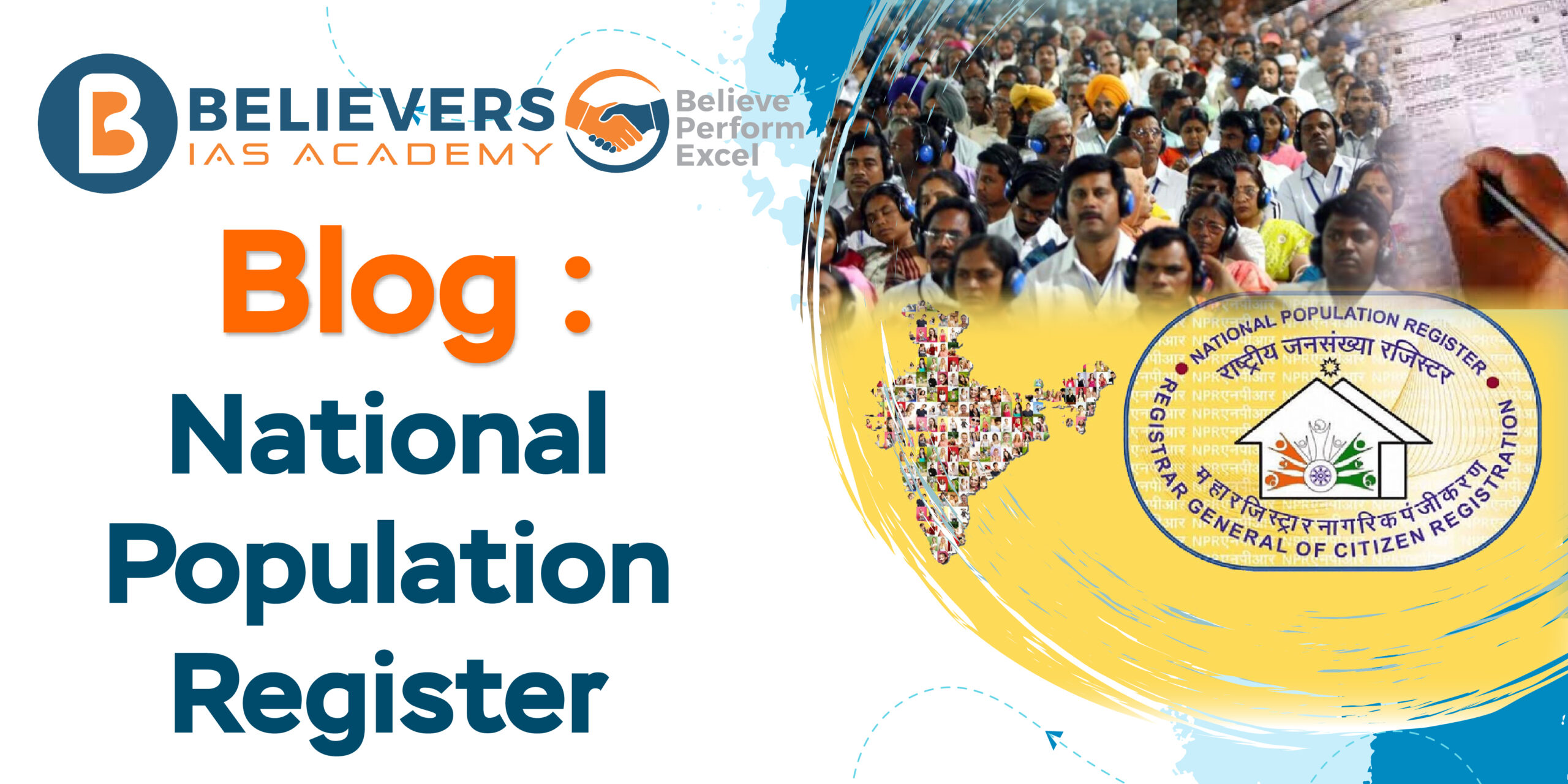National Population Register
What is National Population Register?
- The National Population Register (NPR) is a register that includes information on people who typically live in a town, village, ward, or other region that is delineated within a ward of a town or city.
- Under Sub-rule (4) of Rule 3 of the Citizenship (Registration of Citizens and Issue of National Identity Cards) Rules, 2003, created per the Citizenship Act, 1955, NPR was initially created in 2010 and revised in 2015. Along with House listing and Housing Operations of the next Census, the NPR would be updated to reflect the changes brought about by birth, death, and migration.
- The National Population Registry’s goal is to compile a thorough record of the nation’s typical residents. Throughout this activity, no document will be gathered.
What are the objectives behind NPR?
- By gathering fundamental demographic information and biometric information, NPR wants to compile an extensive database of regular residents of India, including both citizens and non-citizens.
- The demographic information will help the government create policies that are appropriate for particular regions and communities in light of those communities’ requirements.
What is the information gathered as a part of NPR?
- Basic demographic information such as name, gender, date of birth, place of birth, nationality, educational background, address, marital status, identity mark, Aadhar card, PAN card, and other identification documents are among the details that have been gathered.
- Additionally, biometric data is gathered to update the database.
What are the responsibilities of NPR?
- The NPR includes house-to-house enumeration for data gathering and is conducted under the direction of the Central Government.
- The length of the enumeration is announced in the Official Gazette by the Registrar General of Citizen Registration.
- Before entering the information into the Local Register of Indian Citizens, Local Registrars are in charge of verifying and reviewing the information that has been gathered.
What is the difference between NPR and Census?
- NPR and the Census are different in that they are both carried out by the Registrar General and Census Commissioner of India.
- The Census is based on self-declaration by people with no need for verification, whereas NPR requires the sharing of demographic information.
- In contrast to the Census, which offers a total population count, NPR strives to compile a thorough database of regular inhabitants.
What is the relationship between NPR and the National Register of Citizens?
- Objective:
-
-
- NRC: The primary goal of the NRC is to compile a list of Indian nationals who reside in a certain state or area. It is a procedure for determining illegal immigrants and confirming people’s citizenship status.
- NPR: The NPR’s main goal is to compile a thorough database of regular residents of India, both citizens and non-citizens. It is a population register designed to gather demographic information for policy formulation and comprehending the demographic makeup of the nation.
-
- Inclusion Standards:
-
-
- NRC: The NRC procedure calls for applicants to demonstrate their Indian citizenship by submitting particular documents that confirm their ancestry and stay in India before a set deadline.
- NPR: All people who regularly dwell in India are included in the NPR, including those who have been there for at least six months or who plan to stay for at least another six. Both citizens and non-citizens are included in the exercise, which is not a citizenship enumeration exercise.
-
- Verification Methodology:
-
-
- NRC: Individuals must submit documentation to confirm their citizenship as part of a rigorous verification process under the NRC. The procedure could involve establishing citizenship through the verification of a person’s family tree, documents, and other means.
- NPR: The primary goal of the NPR process is to gather demographic and biometric information about regular people. The NPR does not specifically entail citizenship status verification.
-
- Implementation:
-
-
- NRC: The NRC is implemented on a state or regional basis and necessitates significant administrative work for verification and citizenship status determination.
- NPR: Under the direction of the Central Government, a nationwide exercise called the NPR entails gathering demographic information from regular citizens all around the nation.
-
- Scope:
-
- NRC: Only those states or regions where the government decides to implement it are subject to the NRC procedure.
- NPR: Regardless of their location or state of residency, the NPR aspires to reach all regular residents of India.
What are the oppositions expressed by some states in India?
- States like West Bengal and Kerala have resisted the NPR because they are worried about any connections it may have to the NRC and because of problems with the Citizenship Amendment Act (CAA).
- According to several states, the NPR violates the federal government’s framework and infringes upon their constitutional rights.
- There are worries about duplicating data collection efforts given that citizens already have Aadhar cards.
- Data utilization and potential sharing with private entities: privacy issues and security measures.
- If states continue to fight NPR, implementation could be delayed.
What is the way forward?
- addressing CAA-related issues to win the public’s trust.
- spreading information about NPR and its goals through a variety of channels.
- NPR should be emphasized as a stand-alone practice rather than as a direct route to NRC.
- enhancing alien identification systems and expanding the number of tribunals.
- In developing NPR policy, taking into account the principles of the Supreme Court’s Right to Privacy.
In conclusion, it’s critical to address valid concerns when implementing NPR and to maintain transparency. It is essential to establish public trust and set NPR apart from NRC. A successful NPR implementation depends on striking a balance between people’s rights and national security.





